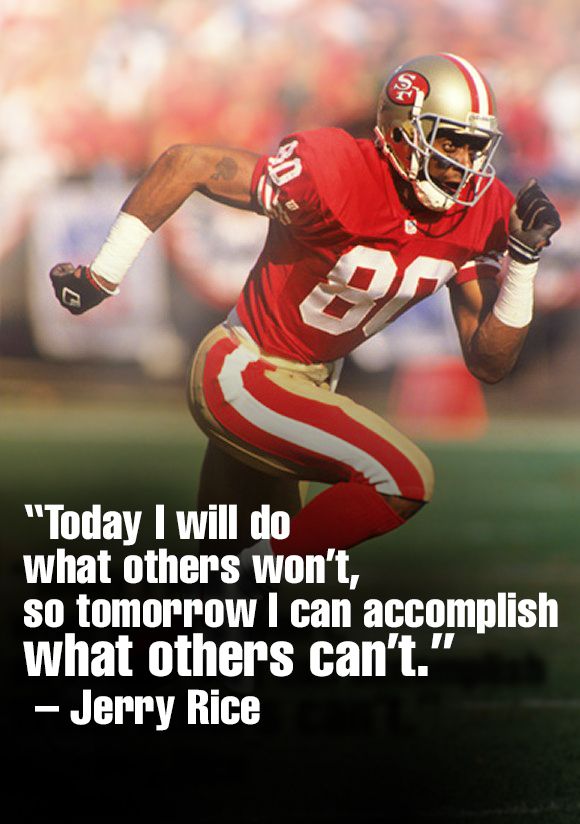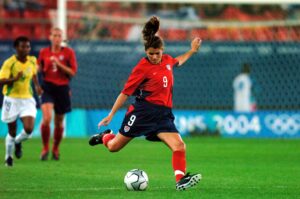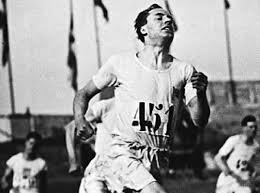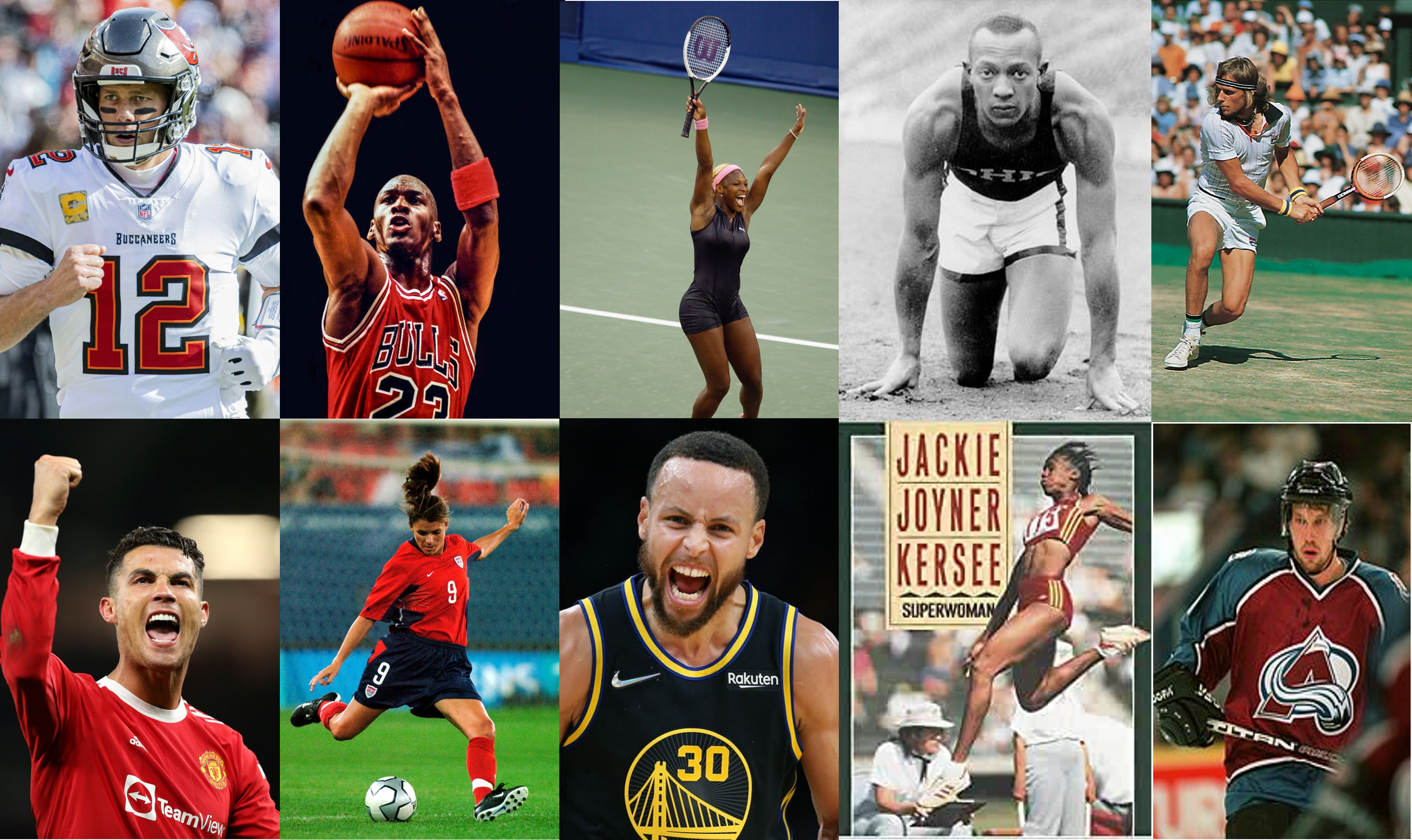With all the action in sports lately, from college football championships to the NFL playoff hunt, it’s got me thinking about life lessons I’ve learned from sports.
No doubt we can learn plenty from sports about things like teamwork and group dynamics. But what does it teach us about life?
I’ve been an athlete my whole life, starting at age five on the soccer field and continuing through college athletics and beyond. I ran track in high school and played baseball, tennis, racquetball, and a little basketball while growing up. I loved running 10K races with my Dad and brother when I was growing up and dabbled in triathlon as an adult.
What are the lessons that have stuck with me from all these experiences?
There’s great power in having and pursuing a dream.
In sports, great motivation flows from the quest for a championship. And so it is in life.
What’s our quest? Our burning desire? What would be a good life for us? What motivates us down to our bones? Our dreams and aspirations can light us up and fill us up with hope and energy, prodding us to take more action in pursuit of our aims.
“Somewhere behind the athlete you’ve become and the hours of practices and the coaches who have pushed you… is a little girl who fell in love with the game and never looked back. Play for her.”
-Mia Hamm, legendary U.S. women’s soccer champion
Hard work and dedication set us apart.
Growing up in southern California, I played for the Choppers, a select soccer team with players from around the area. Our coach was into fitness. Big-time. I don’t think he ever wore a shirt at practice. He was always buff and tan. And he worked us like dogs. He focused on fitness, not just skill work. We did pushups and sit-ups alongside our soccer drills. He often had us race each other to see who was the fastest and who had the most stamina and heart.
His lessons stuck with me when I played college ball. I was a good midfielder, but I prided myself on my conditioning. I knew it could give me a big advantage. Nobody would be running as hard as I would be late in the game (or in double overtime) because I had put in massive work before the season began.
There are many things we want in life, for ourselves and our family. The question is what we’re willing to do to obtain them. Hard work day after day can add up to tremendous progress and, importantly, to learning and momentum for more forward progress.
Hard work is amplified greatly by a deliberate and disciplined process and pursuit.
Do we have systems in place to get a little better each day? And to track progress?
Growing up, I always admired wide receiver Jerry Rice. He was fun to watch over his 20 seasons in the National Football League, not only because of his clutch plays but also because of his speed, stamina, athleticism, and great blocking. He retired with an amazing array of records, from most touchdowns and touchdown receptions to most receiving yards and most career points scored for a non-kicker. Not to mention three Super Bowl titles. (Check out his career highlights video.)
In the book, Talent Is Overrated, author Geoff Colvin recounts Rice’s approach:
“In team workouts he was famous for his hustle; while many receivers would trot back to the quarterback after catching a pass, Rice would sprint to the end zone after each reception. He would typically continue practicing long after the rest of the team had gone home. Most remarkable were his six-days-a-week off-season workouts, which he conducted entirely on his own. Mornings were devoted to cardiovascular work, running a hilly five-mile trail; he would reportedly run ten forty-meter wind sprints up the steepest part. In the afternoons he did equally strenuous weight training. These workouts became legendary as the most demanding in the league….”
The key, though, wasn’t just hard work. Rice, according to Colvin, was also very deliberate and strategic about the way he worked out, including designing his training to work on his specific needs (e.g., running precise patterns, evading defenders, outjumping and outrunning people, etc.) and spending as much time as possible on classroom study, conditioning, and working on specific plays.

“Today I will do what others won’t, so tomorrow I can accomplish what others can’t.”
-Jerry Rice, champion wide receiver in the National Football League
The confidence that comes from dedication and hard work over a long period of time can be transformative.
One of my favorite photographs of my years on the soccer pitch is a snapshot of my high school co-captain and me posing with Coach Murph after a game. Part of it was that Lahmmy was such a character and Coach was such a great mentor, but mostly it’s that look on our faces. A look of defiant knowing and staunch assurance. We had suffered mightily in practice, with brutal “suicides” (sprints up and down the pitch) a million times. We were in the best shape our lives, and we were ready for any opponent.
Perseverance has magical properties.
One year, when I played for the Galaxies as a teenager, we traveled from Ohio to Florida for a soccer tournament. Late in the tournament, we were getting crushed by a strong team. They were older and much bigger. Late in the match, we were down something like 9-0, but still we hung in there. Sprinting after every ball. Tackling as hard as we could. We played with the same intensity as if we were down a goal with a minute to go. By the end of the game, even the other team’s parents were rooting for us. The crowd erupted when one of our players made a great play—a small but sublime victory of sorts.
Sir Alex Ferguson, legendary soccer coach and former manager of Manchester United, emphasized not only work ethic, emotional fortitude, and extraordinary concentration, but also “a refusal to admit defeat.” Some would say our perseverance was pointless that day. But we knew better. We were playing for ourselves that day, proving something about the kind of players we were—and the kind of team we were building.
When adversity comes, it’s a chance to rise.
One day at practice with the Galaxies, a much older player came to practice with us. As I planted my left leg for a kick, he tackled me hard and broke my femur just above the knee. As I was recovering, with six weeks in a full-leg hard cast followed by another six weeks in a soft cast, I learned that the break was right at one of my growth plates. It meant that I needed surgery on my right leg after my broken left leg healed so my legs wouldn’t be too uneven. Another twelve weeks or so for that leg, followed by physical therapy.
I was devastated. It was a test of whether I’d keep playing. I didn’t want an injury to define me, so I worked hard and came back stronger than ever.
“The harder the conflict, the more glorious the triumph.
What we obtain too cheap, we esteem too lightly.”
-Thomas Paine, political activist and revolutionary
We must go on the attack when it comes to the important things we want in life.
Marvelous things can happen when we go for it and put ourselves on the line in the face of potential failure. In soccer, I played center midfield in college. As a midfielder, I prided myself on diligently covering the whole field vertically, helping both on offense and defense.
My sophomore year, as I was gaining confidence, I realized that I had to take more shots, and I had to upgrade my mindset. Instead of thinking too much and worrying about whether I’d get a good shot off, or miss, I had to go into attack mode: attack the goal with a cracking shot. Let it rip.
And so it is in life: are we taking enough risks and putting ourselves out there?

“I learned a long time ago that there is something worse than missing the goal, and that’s not pulling the trigger.”
-Mia Hamm, legendary U.S. women’s footballer
Urgency can light fires.
When I watch a soccer game now, one of the things I look for is what happens after a team scores. Of course, there’s the obligatory celebration by the scoring team. But much more important is what the other team does.
I learned this in college from my teammate, Peter. After we gave up a goal, he would haul into the back of our net, fish out the ball, and sprint like a demon possessed to the center spot.
The point was clear: We’re down one, so we need to pick it up. Way up. Forget about the goal. Let’s roll.
Too many teams wallow for precious minutes while their hopes are dwindling. Not Peter. His urgency lit a fire under us, and I never forgot it.
The same thing happens in life. Too often, when we experience a setback, we sit and wallow. We lose our momentum. Or we complain. We look for people or things to blame. Much better to get back to work right away, knowing that the game is still afoot and time is precious.
We learn a lot about ourselves when we hit the wall.
In high school track meets, I ran the 400-meter dash. Many of my teammates called it the hardest event in track, because of the toll it takes on your body to sprint for that long. (1)
During the race, most of us “hit the wall” somewhere on the final stretch, depending on how we had run the first 300 meters. Hitting the wall is awful—as strange as it is disorienting. Your legs suddenly feel like bricks. You have to struggle mightily to keep moving them forward. You feel your whole body starting to tense up and shut down. Every step gets harder. But still you have to finish, so you keep pushing forward.
Important questions arise when you hit the wall: Do you have the strength to see it through? How well do you finish the race? And how do you respond on Monday at practice? What do you do to get better?

“And where does the power come from, to see the race to its end?
From within.”
-Eric Liddell, Scottish runner and Christian missionary, from the film “Chariots of Fire”
The inner game is often where things are won or lost.
In sports, it’s easy to assume that the physical game—our skill, strength, endurance, etc.—makes all the difference. But often, the mental game is more important.
In his book, The Inner Game of Tennis, author, tennis player, and coaching pioneer Tim Gallwey notes the pitfalls of fighting the mind and letting our ego take over. On the flipside, he highlights the benefits of mastering the art of relaxed and effortless concentration and of focusing the mind properly while not trying too hard.
And so it is in life. Too often, we’re focused on the outer game of competitive jockeying, career climbing, ego stroking, and material accumulation, but it’s our inner world that we need to pay more attention to.
We have to stop becoming our worst opponent. We need to silence our negative self-talk and replace it with something that actually serves us.
“…the inner game. This is the game that takes place in the mind of the player, and it is played against such obstacles as lapses in concentration, nervousness, self-doubt and self-condemnation. In short, it is played to overcome all habits of mind which inhibit excellence in performance.”
-W. Timothy Gallwey, The Inner Game of Tennis
There’s always a bigger picture beyond the game we’re playing.
In sports, it’s easy to get lost in the drama of the game and boil it down only to the final score. But sports is about more than winning and losing. Recall the Olympian pledge:
“Ask not alone for victory. Ask for courage. For if you can endure, you bring honor to yourself.
Even more, you bring honor to us all.”
Sports is not only about the quest for victory but also about challenge, discipline, character, mettle, teamwork, fair play, sportsmanship, grace, and transcendence.
And so it is in life. In the end, it’s about something much larger than victory or success alone. It’s about learning, growth, development, close relationships, commitment, purpose, contribution, and love.
“The moment of victory is much too short to live for that and nothing else.”
-Martina Navratilova, professional tennis champion
And, as with sports, we must prepare not only for the race or game but the years after too.
Conclusion
What are my life lessons from sports? Playing sports has shaped me in so many ways. I loved being on the field with my teammates. Training in the Texas heat and dripping with sweat. Staring down the curve of my lane from the starting line, waiting for the gun. The camaraderie and joy on the bus on the way back from a competition.
I made lifelong friends and learned so much about myself, life, and leadership. I’m thankful not only for the moments in competition but also for their strong and lasting echoes.
Reflection Questions
- What have you learned from sports or other activities or endeavors that have enriched your life?
- What more will you do to honor those lessons and carry them forward in your life today?
Tools for You
- Traps Test (Common Traps of Living) to help you identify what’s getting in the way of your happiness and quality of life (new book in the works on this)
- Goal-Setting Template (Beyond SMART Goals) to help you set goals you can achieve based on best practices
- Quality of Life Assessment to help you discover your strongest areas and the areas that need work and then act accordingly
Related Articles and Books
- “What I Learned about Leadership from Playing Sports”
- “What We Can Learn from the Olympics about Life and Leadership”
- “Designing Your Work for Flow”
- “Are You Playing the Long Game?”
- Timothy Gallwey, The Inner Game of Tennis: The Classic Guide to the Mental Side of Peak Performance (Random House, 1997)
- David L. Cook, Golf’s Sacred Journey: Seven Days at the Links of Utopia (Zondervan, 2006)
- David L. Cook, Greatness (Sacred, 2021)
- Steven Pressfield, The Legend of Bagger Vance: A Novel of Golf and the Game of Life (Avon Books, 1996)
- Fredrik Backman, Beartown: A Novel (Beartown Series, Atria Books, 2018)
Postscript: Inspirations on Sports, Life, and Leadership
- “Excellence is the gradual result of always striving to do better.” -Pat Riley, former NBA basketball coach and player
- “I always felt that our triumphs were an expression of the consistent application of discipline.” -Alex Ferguson, Leading: Learning from Life and My Years at Manchester United
- “Hard days are the best because that’s when champions are made.” -Gabby Douglas, artistic gymnast and Olympic champion
- “If it doesn’t challenge you, it won’t change you.” -Fred DeVito, fitness expert and entrepreneur
- “Fighting the mind does not work. What works best is learning to focus it.” -W. Timothy Gallwey, The Inner Game of Tennis
- “You miss 100 percent of all the shots you never take.” -Wayne Gretzky, legendary hockey champion (a.k.a., “the great one”)
- “Show me a guy who’s afraid to look bad, and I’ll show you a guy you can beat every time.” -Lou Brock, professional baseball player
- “Anxiety is fear about what may happen in the future, and it occurs only when the mind is imagining what the future may bring. But when your attention is on the here and now, the actions which need to be done in the present have their best chance of being successfully accomplished, and as a result the future will become the best possible present.” -W. Timothy Gallwey, The Inner Game of Tennis
- “I skate to where the puck is going to be, not where it has been.” -Wayne Gretzky, legendary hockey champion (a.k.a., “the great one”)
- “Audentis fortuna iuvat.” (“Fortune favors the bold.”) -Virgil, ancient Roman poet
- “I may win and I may lose, but I will never be defeated.” -Emmitt Smith, former NFL running back and all-time leading rusher
“Every time a football player goes out to ply his trade he’s got to play from the ground up—from the soles of his feet right up to his head. Every inch of him has to play. Some guys play with their heads. That’s O.K. You’ve got be smart to be No. 1 in any business. But more important, you’ve got to play with your heart—with every fiber of your body. If you’re lucky enough to find a guy with a lot of head and a lot of heart, he’s never going to come off the field second.”
-Vince Lombardi, legendary American football coach, Green Bay Packers,
considered by many to be the greatest coach in football history
(1) I always thought the 800 was worse.
+++++++++++++++++
Gregg Vanourek is a writer, teacher, TEDx speaker, and coach on personal development and leadership. He is co-author of three books, including LIFE Entrepreneurs: Ordinary People Creating Extraordinary Lives (a manifesto for integrating our life and work with purpose, passion, and contribution) and Triple Crown Leadership: Building Excellent, Ethical, and Enduring Organizations (a winner of the International Book Awards). Get his monthly newsletter. Gregg was a co-captain of his high school and college soccer teams and high school track team, First-State in high school track, and collegiate Academic All-American soccer player (Division III). If you found value in this article, please forward it to a friend. Every little bit helps!






